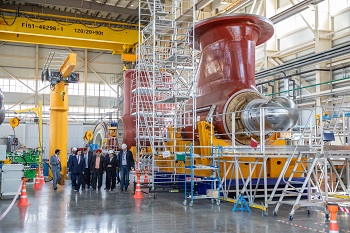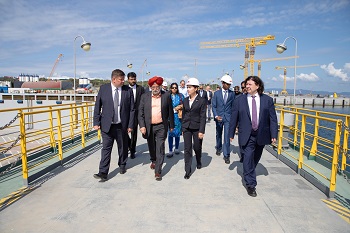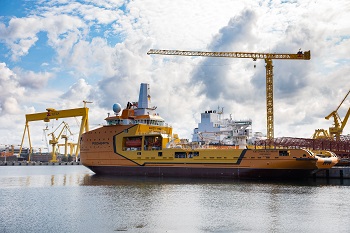Indian delegation headed by Hardeep Puri, Minister of Petroleum and Natural Gas, visited Zvezda, the largest shipbuilding yard

A delegation headed by Hardeep Puri, Minister of Petroleum and Natural Gas, Minister of Housing and Urban Affairs of India, visited the Zvezda shipbuilding yard located in the city of Bolshoy Kamen, Primorye Territory.
The cooperation between Russia and India is developing in many industries, including energy, shipbuilding, space, agriculture and others. In 2019, President of Russia Vladimir Putin and Prime Minister of India Narendra Modi visited Zvezda shipyard and got to see its construction progress. "In 2019, when I had visited Vladivostok to attend the forum, I had announced India's commitment to enact Far East Policy," Narendra Modi said at the plenary session of the Eastern Economic Forum (EEF) held on 02 September. "This policy is a very important part of our special and priviledged strategic partnership with Russia." In this context, Modi made a pointed reference to an agreement between Zvezda and Indian shipyard Mazagon Dock Shipbuilders Limited, concluded with an intention to interact in the area of civil shipbuilding, and in particular to share experience and best practices.
The Zvezda shipyard is being built by a Rosneft-led consortium of investors on the basis of an assignment of the President of Russian Federation. Principally new technological solutions applied for its construction will make the facility one of the most advanced shipyards in the world.
The Zvezda shipyard will be completed in 2024 and is being constructed over two phases. Facilities of the expanded first phase have been commissioned, including the hull fabrication shop, paint shops, open heavy-duty outfitting ways equipped with unique cranes and advanced self-propelled transport system, load out barge.
The commissioned facilities made it possible to start building a number of vessels, including the sophisticated Aframax tankers, without waiting for the completion of the second phase construction operations.
 During the visit, the Indian delegation saw an Aframax tanker, which was set afloat on 02 September and towed to the outfitting quay for the mooring trials stage. This vessel became the second in a series of 12 superlarge tankers with a deadweight of 114 k tons. Vladimir Monomakh, the lead tanker, was delivered to the customer in December 2020.
During the visit, the Indian delegation saw an Aframax tanker, which was set afloat on 02 September and towed to the outfitting quay for the mooring trials stage. This vessel became the second in a series of 12 superlarge tankers with a deadweight of 114 k tons. Vladimir Monomakh, the lead tanker, was delivered to the customer in December 2020.
The Aframax class tanker was built on the heavy duty open outfitting stocks. This complex engineering facility is one of the largest globally and the largest in Russia. The stocks include three keel tracks with a unique self-propelled transport system.
The stocks are equipped with four 100-ton gantries, two 320-ton overhead cranes and a first-of-kind for Russian shipyards 1200-ton Goliath crane. For comparison, the maximum capacity of cranes operated at other Russian shipyards is only 500 tons.
The Vympel load-out barge is the most important element of the shipyard. It enables Zvezda to handle shipbuilding orders, which couldn't previously be executed at Russian shipyards. The barge is of unsupported design and allows longitudinal rolling of vessels from the shipyard's three different staple lines and transverse rolling of offshore facilities.
The load-out barge is intended for putting afloat large-capacity vessels with a length of 300 meters and width in excess of 50 meters, as well as marine facilities, including drilling platforms and their elements, while ensuring high quality and safety of launching.
In December 2020, Katerina Velikaya, the first high ice-class (Icebreaker 7) multi-purpose supply vessel was launched. This is the lead ship in a series of four vessels intended for Rosneft. Vladimir Putin, President of the Russian Federation, took part in its keel-laying ceremony. Parallel work is ongoing at the shipyard to build three other vessels of the series.
Besides, the Sapphire Pod Drive Plant was constructed at the site of Zvezda shipyard. Manufacturing of 7.5 MW pod drives has already been launched at the plant. The pod drives are the key component of the ship power system. The developed pod drive design ensures high ice and maneuvering qualities of seagoing vessels during the navigation period along the Northern Sea Route and enables operation in severe ice conditions.
 A dry dock is a unique facility of Zvezda, which was constructed way ahead of schedule and prepared for commissioning. Technical parameters of the dry dock will allow the construction of most types of existing and prospective ships with almost no restrictions on the tonnage or launch weight of the hulls. With its dimensions of 485 х 114 х 14 m, the dock is the only such facility in Russia and one of the world's largest maritime hydraulics.
A dry dock is a unique facility of Zvezda, which was constructed way ahead of schedule and prepared for commissioning. Technical parameters of the dry dock will allow the construction of most types of existing and prospective ships with almost no restrictions on the tonnage or launch weight of the hulls. With its dimensions of 485 х 114 х 14 m, the dock is the only such facility in Russia and one of the world's largest maritime hydraulics.
Facilities of the second phase, when commissioned, will expand the capabilities of Zvezda shipyard and enable building vessels and marine facilities without any limitations. Facilities of the second phase include the largest in Russia dry dock and additional full cycle manufacturing workshops for building large-capacity vessels and marine facilities.
Indian companies have been Rosneft's long-standing partners developing an integral format cooperation in the energy industry, from production to refining and petroleum products sales. The projects they jointly develop in Russia include the Vankorneft, Taas-Yuryakh Neftegazodobycha, and Sakhalin-1 production projects. Rosneft also stands as a supplier of hydrocarbons to India and a shareholder of Indian Nayara Energy.
"These projects enabled us to become leaders of the investment cooperation between Russia and India. The scope of mutual investments in the projects participated by Rosneft and Indian partners exceeds 17 bln dollars. This accounts for more than a half of the total cumulative Russian-Indian investments to date," stated Rosneft Chief Executive Officer Igor Sechin during the meeting with Minister Puri held on 01 September. The meeting discussions covered the implementation of joint projects, development of cooperation in the area of oil and gas production, refining and petrochemicals, sales of hydrocarbons.
For reference:
The product line of Zvezda includes tankers, gas carriers, drilling platforms, vessels of ice class, including the world's most powerful nuclear Leader icebreakers. Zvezda will be a competitor to foreign yards, and supply Russia with merchant marine for the development of offshore fields, ensuring uninterrupted operation of the Northern Sea Route, the shortest one between Europe and Asia.
To date, Zvezda's portfolio of orders features 12 Aframax tankers, 10 of which are intended for Rosnefteflot (a specialized Subsidiary of Rosneft). Work is currently ongoing in the shops and on the stocks to build and assemble six Aframax tankers.
Cooperation between Rosneft and India. Starting from 2016, the Indian companies (ONGC Videsh Ltd., Oil India Limited, Indian Oil Corporation and Bharat Petroresources) own 49.9% in the Vankorneft Subsidiary. Located in the Krasnoyarsk Territory, this Company develops the Vankor oil and gas condensate field, the largest among the fields discovered and brought into production in Russia for the past twenty five years.
Besides, the consortium of Indian companies (Oil India Limited, Indian Oil Corporation and Bharat Petroresources) owns 29.9% of Taas-Yuryakh Neftegazodobycha (Oil and Gas Production) company, the holder of development licenses for the Central Block of Srednebotuobinskoe Field and the Kurungsky License Area (other shareholders are Rosneft and BP).
Since 2001, Indian ONGC Videsh Ltd. has been a participant of the Sakhalin-1 Project (other shareholders are Rosneft, ExxonMobil, and Japanese Sodeco). In 2020, the project produced 12.4 million tons of oil and condensate, supplied more than 2.4 bcm of gas to customers.
Rosneft owns a share (49.13%) in Nayara Energy, an Indian company with first-class assets including a 20 mmtpa refinery near the city of Vadinar. It is the second-largest refinery in India and one of the most technologically advanced refineries in the world. The Indian company has already started implementation of the Refinery Upgrade Program: Stage 1 envisages installation of polypropylene production plants for up to 450 thousand tons per annum. Nayara Energy's business incorporates a deep-water port capable of receiving the ultra-large VLCC tankers and one of the largest fuel retail networks in India, which already includes about 6,200 outlets. Nayara Energy also plans to further expand its retail network in India to 8 thousand outlets in the next 3 years.
Rosneft Information Division
5 September 2021